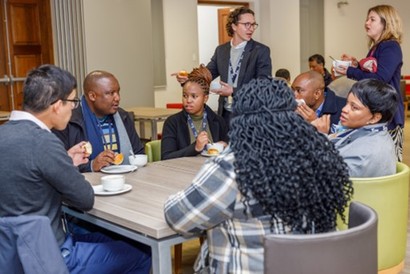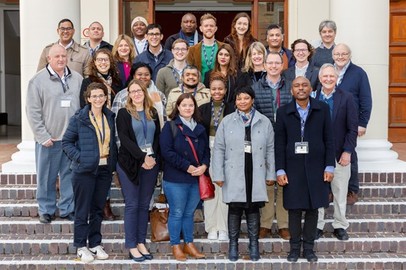Stellenbosch Hosts Third Pretoria-Stellenbosch PhD Workshop in Economics

Thamsanqa Nhlapo (University of Pretoria) presenting his paper “Minerals, Sectoral Linkages and Structural Transformation in a Small Open Economy”.
A very successful PhD Economics workshop, the third in a series organized jointly by the Departments of Economics at Pretoria and Stellenbosch, was recently hosted by Stellenbosch University on its campus.
The workshop managed to attract close to 30 paper submissions by PhD students and postdocs from universities across the country, of which eight were accepted for the workshop programme. Papers were presented on topics ranging from health economics, macroeconomics, finance to labour economics. (Click here to download the programme.)
Discussants from universities in the United States, Australia, Germany, and South Africa gave comments and critical feedback to the student participants. Several of the students mentioned that the critique from senior academics outside of their home institutions was especially valuable, and exposed them to new ideas they had not previously considered.
The programme also included two keynote addresses. The first was by David Atkin (MIT) on the role of trade in promoting industrial complexity and economic development. His talk was especially well-received, leading the audience to raise several questions about the potential vulnerabilities of protectionism and industrial policy to rent-seeking. The second keynote was given by Eric Hanushek (Stanford), on the topic of measuring the extent to which the world's children attain basic mathematical skills. He presented work showing that at least two-thirds of the world's children cannot complete basic arithmetic problems involving multiplication by age 15 - a finding that, the audience debated, was either cause for extreme pessimism about education systems or extreme optimism about the potential for future growth.
The event was also attended by practising economists and researchers from institutions such as the National Treasury, Statistics South Africa, and the Bureau of Economic Research, which allowed the PhD students further opportunities to engange and network with professionals in the field, in addition to fellow PhD students at other universities.
The programme also made provision for group and individual coaching on presentation and writing skills, which the students indicated as being very valuable to them at this juncture.
The organising committee consisted of Jesse Naidoo (Pretoria), Mamello Nchake (Stellenbosch) and Marisa von Fintel (Stellenbosch). Generous support of the sponsors are gratefully acknowledged: Economic Research Southern Africa, Research on Socio-Economic Policy (Stellenbosch University) and the Department of Economics, Stellenbosch University.
The University of Pretoria will host the workshop next year; the call for papers will be published in early March 2024.

Letsie Mohatonyane (Wits) explains a subtle point to others at lunch.

Conference Participants. Back row: Craig Lemboe (BER), Calumet Links (SU), Thamsanqa Nhlapo (UP), Letsie Mohatonyane (Wits), Xanthe Hunt (SU), Waleed Jacobs (Statistics SA), Melt van Schoor (SU). Second from back: Anja Smith (SU), Jesse Naidoo (UP), Peter Courtney (SU). Middle row: Marius Cronje (Statistics SA), Katrien Smuts (SU/BER), Richard Freund (UCT), Evashnie Govender (Statistics SA), Marisa von Fintel (SU), Tim Kohler (UCT), Servaas van der Berg (SU). Second from front: Ayanda Hlatshwayo (National Treasury), Mahier Hattas (Statistics SA), Tsepang Khumalo (SU), Neil Rankin (SU/Predictive Insights), Eric Hanushek (Stanford) Front row: Antoinette van der Merwe (UP), Susan Godlonton (Williams College), Christie Swanepoel (UWC), Mamello Nchake (SU), Kiru Sichoongwe (UJ).
[Thanks to the workshop organisers for contributing material for this article.]
Login
(for staff & registered students)
Upcoming Seminars
Monday 16 February 202612:10-13:10
Dr Matthew Olckers
Topic: "Do Digital Cash Transfers Create Persistent Financial Inclusion? Evidence from Mobile Money in Togo"
13:10-14:10
Prof Gregory Lane
Topic: "Beliefs, forecasts, and investments: Experimental evidence from India"
12:10-13:10
Frank Bohn
Topic: "The “Benefits” of being small: Loose fiscal policy in the European Monetary Union"
BER Weekly
23 Jan 2026 Free Weekly Review | Number 3 | 23 January 2026This report covers the key domestic and international data releases over the past week....
Read the full issue
Upcoming Seminars
Monday 16 February 202612:10-13:10
Dr Matthew Olckers
Topic: "Do Digital Cash Transfers Create Persistent Financial Inclusion? Evidence from Mobile Money in Togo"
13:10-14:10
Prof Gregory Lane
Topic: "Beliefs, forecasts, and investments: Experimental evidence from India"
12:10-13:10
Frank Bohn
Topic: "The “Benefits” of being small: Loose fiscal policy in the European Monetary Union"
BER Weekly
23 Jan 2026 Free Weekly Review | Number 3 | 23 January 2026This report covers the key domestic and international data releases over the past week....
Read the full issue
